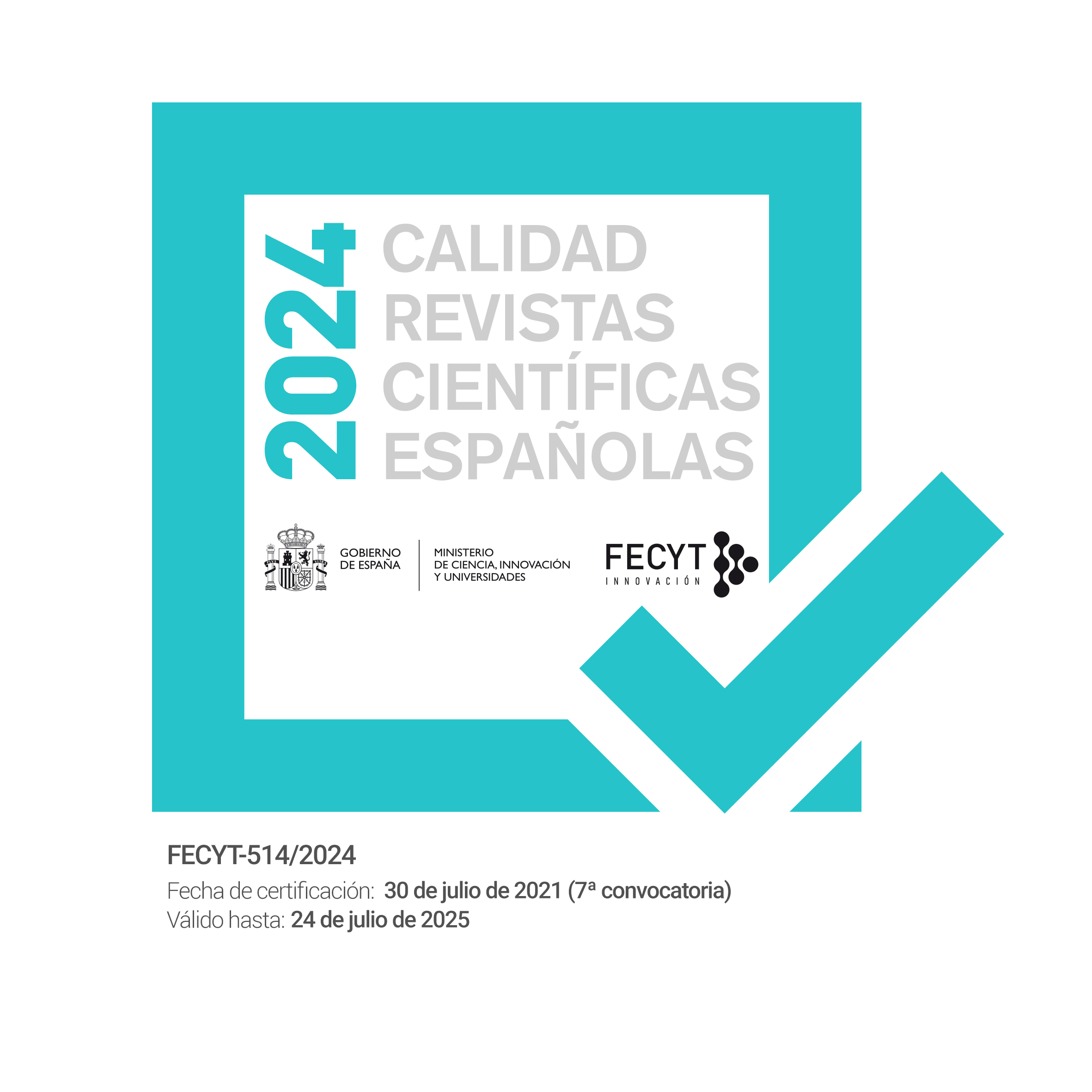DECOLONIAL HOPE AGAINST THE FOURTH INDUSTRIAL REVOLUTION IN EDWIDGE DANTICAT’S CLAIRE OF THE SEA LIGHT (2013)
DOI:
https://doi.org/10.12795/REN.2022.i26.12Keywords:
Haiti, hemispheric literature, Edwidge Danticat, contemporary literature, ecologyAbstract
This article explores Edwidge Danticat’s last novel, Claire of the Sea Light (2013), as a response to Modern/colonial ideologies of progress that continue to emanate from predictions of a Fourth Industrial Revolution. After an analysis of the work of Danticat as literature of the American hemisphere instead of merely Haitian or Caribbean literature, this article contends that the text’s portrayal of nature, the environment, and the past aligns with visions of decolonial hope rather than with the linear progress of the Fourth Industrial Revolution. Through the stories of a small community in Haiti, Claire of the Sea Light portrays the degradation of the environment that ravishes the country and does so in relation to the external forces that affect it, presenting a coloniality of climate associated to racial dynamics of the American hemisphere. The blending of human narratives and environmental ones in the novel nevertheless offers possibilities for resistance and a hopeful vision of the country rooted in decolonial ecologies and Caribbean epistemology. Granting equal importance to the stories of non-human actors in the narrative, the novel positions itself outside the Modern/colonial tradition to embrace a decolonial poetics that offers hope in a world which has proved to continually reproduce its own coloniality as new technology is developed.
Downloads
References
ASHCROFT, Bill. Utopianism in Postcolonial Literatures. Routledge, 2017.
COPE, Robyn. “‘We Are Your Neighbors:’ Edwidge Danticat’s New Narrative for Haiti.” Journal of Haitian Studies, vol. 23, no. 1, 2017, pp. 98-118.
COUPEAU, Steeve. The History of Haiti. Greenwood Press, 2008.
CRUTZEN, Paul. “Geology of Mankind.” Nature, vol. 41, no. 5, 2002, pp. 23.
DANTICAT, Edwidge. Claire of the Sea Light. Penguin Random House, 2013.
---. Create Dangerously: The Immigrant Artist at Work. Princeton University Press, 2010.
---. “Edwidge Danticat Reaches Back and Forward in her New Novel. An Interview with Jeffrey Brown.” PBS Newshour, 17 September 2013. Available online: http://video.pbs.org/video/2365081056/. Accessed 23 August 2021.
DASH, Michael. “Afterword: Neither France nor Senegal: Bovarysme and Haiti’s Hemispheric Identity.” Haiti and the Americas, edited by Carla Calargé, Raphael Dalleo, Luis Duno-Gottberg, and Cleavis Headlet. University Press of Mississippi, 2013, pp. 219-230.
DAYAN, Joan. “Erzulie: A Women’s History of Haiti.” Research in African Literatures, vol. 25, no. 2, 1994, pp. 5-31.
DRABINSKI, John E. Glissant and the Middle Passage: Philosophy, Beginnings, Abyss. University of Minnesota Press, 2019.
DUPUY, Alex. “Disaster Capitalism to the Rescue: The International Community and Haiti after the Rescue.” NACLA Report on the Americas, vol. 43, no. 4, 2010, pp. 14-19.
ESCOBAR, Arturo. “Worlds and Knowledges Otherwise: The Latin American Modernity/Coloniality Research Program.” Globalization and the Decolonial Option, edited by Walter D. Mignolo and Arturo Escobar. Routledge, 2010, pp. 33-64.
FERDINAND, Malcom. “Behind the Colonial Silence of Wilderness: ‘In Marronage Lies the Search of a World’”. Environmental Humanities, vol. 14, no. 1, 2022, pp. 182-201.
--- Decolonial Ecology: Thinking from the Caribbean, translated by Anthony Paul Smith. Polity Press, 2022.
FERNÁNDEZ JIMÉNEZ, Mónica. “Primitivist tensions in Caribbean-American literature: Claude McKay’s and Paule Marshall’s return to the island.” The Journal of Commonwealth Literature, online first, 2022, pp. 1-15.
FUMAGALLI, Maria Cristina. On the Edge: Writing the Border between Haiti and the Dominican Republic. Liverpool University Press, 2015.
GIBBY, Kristina S. “‘So much had Fallen into the Sea:’ An Ecocritical Approach to Danticat’s Claire of the Sea Light.” The Bloomsbury Handbook to Edwidge Danticat, edited by Jana Evans Braziel and Nadège T. Clitandre. Bloomsbury Academic, 2021, pp. 347-364.
GLISSANT, Édouard. Caribbean Discourse: Selected Essays. Translated by Michael Dash. UP of Virginia, 1989.
---. Poetics of Relation, translated by Betsy Wing. The University of Michigan Press, 1997.
GROSFOGUEL, Ramón. “The Epistemic Decolonial Turn: Beyond Political-Economy Paradigms.” Globalization and the Decolonial Option, edited by Walter D. Mignolo and Arturo Escobar. Routledge, 2010, pp. 65-77.
HANTEL, Max. “Toward a Sexual Difference Theory of Creolization.” Theorizing Glissant: Sites and Citations, edited by John E. Drabinski and Marisa Parham. Rowman and Littlefield, 2015, pp. 85-102.
LENNOX, Malissia. “Refugees, Racism, and Reparations: A Critique of the United States’ Haitian Immigration Policy.” Stanford Law Review, vol. 45, no. 3, 1993, pp. 687-724.
MALM, Andreas. “In Wildness Lies the Liberation of the World: On Maroon Ecology and Partisan Nature.” Historical Materialism, vol. 26, no. 3, 2018, pp. 3–37.
MALM, Andreas, and Ralf Holborg. “The Geology of Mankind? A Critique of the Anthropocene Narrative.” The Anthropocene Review, vol. 1, no. 1, 2014, pp. 62–69.
MARTÍNEZ-FALQUINA, Silvia. “Postcolonial Trauma Theory in the Contact Zone: The Strategic Representation of Grief in Edwidge Danticat’s Claire of the Sea Light.” Humanities, vol. 4, pp. 834-870.
MARTÍNEZ, Samuel. Peripheral Migrants: Haitians and Dominican Republic Sugar Plantations. University of Tennessee Press, 1995.
MIGNOLO, Walter D. “Introduction: Coloniality of Power and Decolonial Thinking.” Globalization and the Decolonial Option, edited by Walter D. Mignolo and Arturo Escobar. Routledge, 2010, pp. 1-20.
MONTGOMERY, Marine L. “A Lasiren Song for the Wonn: Edwidge Danticat’s Claire of the Sea Light and the Legend of Mami Wata.” CLA Journal, vol. 59, no. 4, 2016, pp. 316-329.
MOORE, Jason W. Capitalism in the Web of Life: Ecology and the Accumulation of Capital. Verso. 2015.
MUKHERJEE, Bharati. “Immigrant Writing: Changing the Contours of a National Literature.” American Literary History, vol. 23, no. 3, 2011, pp. 680-696.
PUGH, Jonathan and David Chandler. Anthropocene Islands: Entangled Worlds. University of Westminster Press, 2021.
PUGH, Jonathan. “Island Movements: Thinking with the Archipelago.” Island Studies Journal, vol. 8, no. 1, 2013, pp. 9-24.
QUIJANO, Aníbal. “Coloniality and Modernity/Rationality.” Globalization and the Decolonial Option, edited by Walter D. Mignolo and Arturo Escobar. Routledge, 2010, pp. 22-31.
ROBERTS, Neil. Freedom as Marronage. The University of Chicago Press, 1976.
SCHWAB, Klaus. Shaping the Future of the Fourth Industrial Revolution: A Guide to Building a Better World. Currency, 2018.
SHELLER, Mimi. Island Futures: Caribbean Survival in the Anthropocene. Duke UP, 2020.
TURITS, Richard Lee. “A World Destroyed, A Nation Imposed: The 1937 Haitian Massacre in the Dominican Republic.” Hispanic American Historical Review, vol. 82, no. 3, 2002, pp. 589-635.
VERMEULEN, Pieter. Literature and the Anthropocene. Routledge, 2020.
WING, BETSY. Translator’s Introduction. Poetics of Relation by Édouard Glissant. The University of Michigan Press, 1997, pp. xi-xx.
WYNTER, Sylvia. “Beyond the Word of Man: Glissant and the New Discourse of the Antilles.” World Literature Today, vol. 63, no. 4, 1989, pp. 637-648.
XU, Min, Jeanne M. David and Suk Hi Kim. “The Fourth Industrial Revolution: Opportunities and Challenges.” International Journal of Financial Research, vol. 9, no. 2, 2018, pp. 90-95.
ZAMALIN, Alex. Black Utopia: The History of an Idea from Black Nationalism to Afrofuturism. Columbia University Press, 2019.















